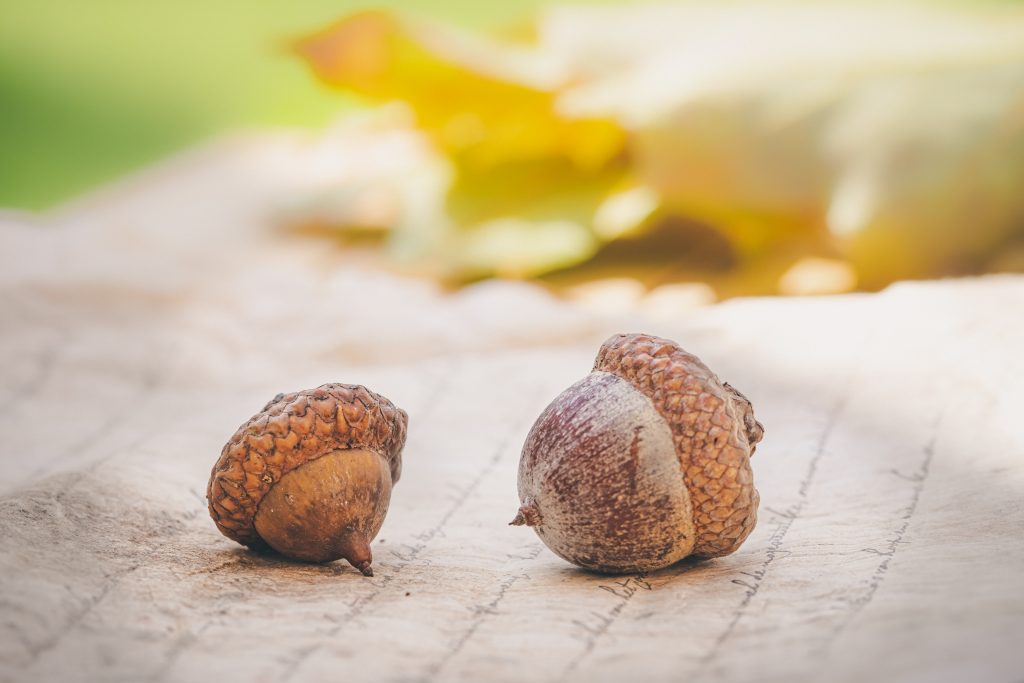In my 20s I just spent whatever money came in, but when I reached my 30s I became more financially conscious and decided that perhaps it was time to think about, you know, actually saving for a house.
I started to look for extra ways to make money and began reading about investing. As I got wiser to the concept of investing, I started experimenting with stocks, cryptocurrencies and various spare change apps. A friend of mine recommended Acorns, which allows you to invest your spare change, as well as investing money on a regular basis with recurring payments.
It’s designed to make investing easy, so you don’t really think about it, it just comes straight out of your account.
I’ve been using the Acorns app for the last couple of months, so I thought I’d give you the lowdown on how it works and what I like about it.
My Acorns Investing Review

When you sign up to Acorns you’ll be asked to choose a portfolio type; Conservative, Moderately Conservative, Moderate, Moderately Aggressive or Aggressive. There’s a questionnaire they use to recommend the best investing strategy for you, but you can choose whichever portfolio you want.
I chose Moderately Aggressive – “A moderately aggressive portfolio is most appropriate for those with longer time horizons, young in age, and a higher risk tolerance.”
Here’s an example of what the portfolio (managed by Vanguard) looks like:

It’s a mixture of large company stocks, emerging market stocks, government bonds, international large company stocks, small company stocks, real estate stocks and corporate bonds.
If you click on each one, you’ll see a graph showing the market gains/losses, along with more detailed information about year-to-date returns. If you want even more detailed information, you can download the Vanguard prospectus.
There are several ways you can invest money with Acorns: One-Time investments, Recurring Investments, Round-Ups and Found Money.
Recurring Investments
Acorns allows you to set up regular recurring investments from your bank account, which you can pause or cancel at any time. These can be as little as $5. You have full control over them, so you can choose the frequency (daily/weekly/monthly) as well as the day of the week your specified amount gets invested.
I currently have my recurring investment set to $150 per week, although I’ll probably get more aggressive with this soon.
I like recurring investments because you can put your money to work as soon as you earn it and you don’t need much money to get started.
One-Time Investments
You can also make One-Time investments, so you can just transfer a chunk of money into your acorn account at once and watch it grow. This is ideal if you already have some spare cash and you want to invest it.
Round-Ups – investing spare change

Round-Ups help you invest your spare change and “grow your oak” faster with micro investing. When you connect your bank accounts or credit cards to Acorns, every time you spend, your transactions will be rounded up to the nearest whole dollar.
So for example, if your coffee is $3.60, it will be rounded up to $4 and the difference will be put into your Acorns Core Account.
If your transaction happens to be a whole dollar amount – say you buy a bagel for $5 – you can choose what that amount will be rounded up to from within your account. The setting ranges from $0 to $1.
If you want to grow your money even faster, you can set Round-Ups multipliers of 2x, 3x or 10x. This way you’ll be investing more money on a regular basis.
The reason Round-Ups and Recurring Investments are great is because of a thing called “dollar-cost averaging”, which is the practice of investing a specific amount of money on a regular basis. When prices are high, you purchase fewer shares, and when prices are low, you can purchase more shares.
Over time it can lower your average cost per share compared to what you may have paid if you bought all shares at once.
Found Money

Found Money is cool because Acorns has a list of over 300 brands that will invest in your Acorns Invest account when you shop with them. They’ll either invest a fixed amount or a percentage of the sale. Think brands like Nike, Expedia, Macy’s Amazon and Apple!
Some of them will invest when you use your linked debit/credit card, or your Acorns Visa Debit Card. Others require you to click through to their store using the app or the Found Money browser extension.
Found Money is typically invested in your Invest account between 90 and 120 days after you make the purchase.
The three types of Acorns accounts
Acorns has three types of accounts. There’s your regular Invest Account, plus Acorns Later and Acorns Spend.
Acorns Invest (which I’m using) is perfect for putting away money toward mid- or long-term goals, like buying a house. You can withdraw your money whenever you like without being penalized, but you can be taxed on any profit you make.
Acorns Later is an Individual Retirement Account (or IRA) that’s designed to help you save for retirement with special tax benefits. This means you’ll pay less in taxes so you have more money for retirement. When you sign up, Acorns recommends one of three types of IRAs for you based on the goals, employment and income info you share. With each type of IRA, you’ll pay less in taxes by agreeing not to withdraw money from the account until you turn 59½ years old. If you withdraw money earlier, you may face certain penalties, so your money is locked up.
Acorns Spend is a bank account with a debit card. You can use your green Acorns Visa Debit Card just like any normal checking account card, in stores and online. If you spend with one of Acorns’ 300 Found Money retail partners, you get money invested into your Invest account. You also get access to the Local Found Money program, where local partner restaurants and retailers automatically invest up to 10% of any purchase you make into your Invest account. The card basically makes it easier to access Found Money. Round-Ups are also available in real-time.
Some other features of the card: No overdraft or minimum balance fees; access to free or fee-reimbursed ATM access nationwide; balance FDIC-insured up to $250,000; ability to freeze and unfreeze card.
What about dividends?
Select funds in your portfolio sometimes offer dividends, which are periodic payouts that some companies give investors on top of regular returns.
Dividends are automatically reinvested to help your balance grow even faster. Acorns says it also regularly rebalances portfolios to maintain an optimal split between stocks and bonds.
How much should you invest?
With Acorns you can start investing with as little as $5 but the more you invest now, the more it will pay off later.
Advisors recommend usually investing around 15-20% of your take-home pay but if it’s too much for you, you can start small and work your way up.
Acorns says that its users typically invest around $30 per month on average.
Acorns fees
The Invest account costs $1 per month.
Invest + Later costs $2 per month.
Invest + Later + Spend costs $3 per month.
Fees are very transparent. This is for balances up to 1 million. The monthly fee rises $100 per month for every million you invest afterwards.
Since the fee is $1 per month for the Invest account, you might want to consider investing larger sums of money. The reason being, if you only invest $5 but the fee is $1 per month, your market gains are likely to be lower than the monthly fee. You want to make sure your gains are covering more than the monthly fee. The more you Invest, the higher your gains are likely to be.
Acorns returns

I signed up for Acorns in August 2019. It’s now November (so 3 months later) and at the time of writing, I’ve had a market gain of 1.48%. I initially started investing with about $50 per week but changed it to $150. I also have roundups on.
I currently have $493.58 in there and I’ve made $7.20.
Historically, the stock market has seen average returns of about 7.5 percent a year.
I’m in my early 30s right now. With $150 invested per week (so $600 per month) Acorns says I have the potential to make over 1 million dollars by age 68! That’s the power of compounding for you.

At age 39, I could potential have nearly $60,000. If I want to grow my money faster though (I’d like to have a house within the next few years), I’ll need to be investing more money per month than I am doing currently.
What I like about Acorns
It doesn’t require a lot of funds
You can start investing with as little as $5, so you don’t need a huge chunk of savings to get started with investing.
When you buy stocks, you usually have to buy a whole stock, you can’t buy a fraction of it. At the time of writing, a share of Facebook is $190, so you would need to have a spare $190 to buy a whole share.
Acorns uses “fractional investing,” a process that lets you buy tiny amounts of exchange-traded funds (ETFs). These ETFs invest in thousands of stocks and bonds. You therefore have a highly diversified portfolio, with your eggs in a lot of different baskets.
It takes the emotion out of investing
I’ve bought individual stocks and cryptocurrencies before, but it can be tempting to panic-sell when the market starts dropping. You end up selling low and buying higher when the market recovers, which is exactly what you shouldn’t be doing. You’re losing money.
With Acorns, I’m just putting money aside and not really looking at it. Because it’s invested in a highly diversified portfolio, I’m not looking at how individual stocks are performing and panic selling.
Any cons?
I also use Robinhood to buy individual stocks. I do see greater returns on some of these stocks. Some stocks can rise 10% in just one day, some stocks gain over 100% in a year. There’s potential to get much bigger returns by buying individual stocks. Acorns growth is much slower, but it’s also less risky. Buying stocks requires a lot of research, so you really need to know what you’re doing.
Summary
All in all, if you’re new to investing I’d say Acorns is a great way to start. Your portfolio is managed for you, so all you need to do is put money in and then the legwork is done for you. It doesn’t require much investing knowledge at all, and you have the potential to make more money than a savings account.
Like the sound of Acorns? If you sign up using my referral link, you get a free $5 put into your Acorns account: https://www.acorns.com/invite/NYZ863
Once you’ve signed up, you can also refer your friends to get $5 per friend too!

